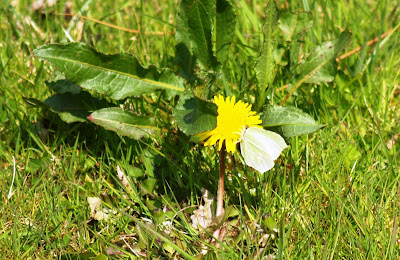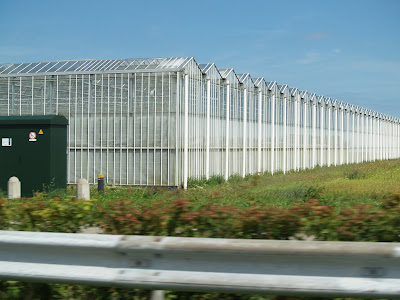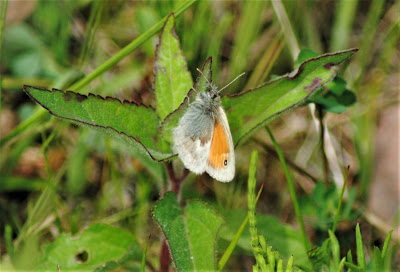This blog may help people explore some of the 'hidden' issues involved in certain media treatments of environmental and scientific issues. Using personal digital images, it's also intended to emphasise seasonal (and other) changes in natural history of the Swansea (South Wales) area. The material should help participants in field-based modules and people generally interested in the natural world. The views are wholly those of the author.
Wednesday, 31 May 2023
Seeing the Changes 1809
On the Loughor-Gorseinon boundary, noted a bush (Rosaceae?) with lots of white flowers, Garden cress (Lepidium sativum) and Self-heal (Prunella vulgaris).
'Talk' to the Animals?
Asking the basic question whether 'humans can ever understand how animals think', seems a bit premature. Behaviour, is a means by which many animal species can increase their DNA's chances of survival in subsequent generations (it's 'adaptive'). Behaviour often enables the organism to more effectively exploit its environment and to deal with change. Behaviour seems to be always an amalgam of genetically-programmed responses and experience-related changes. We tend to call the former 'instinct' and the latter 'learning' (but all behaviours probably have components of both in different ratios). The concept of 'thinking' is linked to the learning component. The concept of 'thinking' animals has currently more salience because it's been gradually recognised that certain skills (like self-recognition, language and estimating probabilities of reward) are not exclusive to Homo sapiens (https://www.theguardian.com/news/2023/may/30/can-humans-ever-understand-how-animals-think). It actually seems unlikely that 'thinking' is an identical process in all humans. Different folk have different what are referred to as 'cognitive styles'. One must consequently conclude that the 'cognitive styles' of different species are going to be even more varied. What's important to different species will vary a lot. They also rely on complex mixtures of senses, again potentially very different from human 'experience'. Perhaps it isn't important to know how animals think? What may be more important, is to recognise that animals shouldn't be regarded as automata. Some have quite complex capabilities. How they arrive at their solutions isn't necessarily going to have direct parallels to human cognition.
Tuesday, 30 May 2023
Seeing the Changes 1808
At Crymlyn Burrows, noted Biting stonecrop (Sedum acre); Woolly thistle (Cirsium eriophorum); Goat's-beard (Tragopon pratensis); Marsh sow-thistle (Sonchus palustris); Yellow iris (Iris pseudacorus) and Common bloomrape (Orobranche minor) in flower. Also spotted my first Cantharis rustica, mating Oedemera nobilis beetles, a digger wasp (Ammophila sabulosa) and a Cinnabar moth (Tyria jacobaeae) of the year.
Monday, 29 May 2023
Chips Off the Ol' Yorkshire Block?
Amite BioEnergy, in Gloster, Mississippi (USA) is owned by the UK power generator, Drax (Selby, Yorkshire, UK). Amite converts trees, from the US deep South, into wood chip pellets. These pellets are burned in Yorkshire, to generate electricity. Amite has recently, again, violated Mississippi's emissions rules. The last time Amite did this (2021), it was fined $2m (https://www.theguardian.com/business/2023/may/29/drax-owned-wood-pellet-plant-in-us-broke-air-pollution-rules-amite-bioenergy-mississippi-emissions-limits). Drax no longer uses coal, to generate electricity. However, burning American wood pellets, is light-years away from being a 'green' alternative. 'Greenhouse gas' emissions will be generated by transporting the trees to Gloster. Energy will also be used in the manufacture of the wood pellets. Further substantial emissions will then be generated by transporting these pellets to Yorkshire for burning. The process wouldn't be carbon neutral, even if only local trees were used to provide pellets. This looks like classical (subsidy-assisted) 'greenwash', for an electricity generator that should have simply been closed. It's actually 'adding insult to injury', that Amite are exposing Mississippi folk, to health-damaging emissions. From Yorkshire, with love?
An Uphill Struggle
Many insects are important pollinators of plants. These animals are often highly mobile. Many can fly, some for considerable distances. These invertebrates also often have short generation times. Some, migratory species of insects, have several broods in a single season. Many insects are currently changing their locations. Some are moving up the sides of mountains and hills. Ultimately, this is not sustainable. Sooner or later, these critters will reach the tops of their land-locked 'islands' (https://www.theguardian.com/environment/2023/may/28/why-the-climate-crisis-is-making-our-insects-run-for-the-hills). In some cases, climate change is not the sole cause of these insect redistributions. Habitat loss, produced by drainage of locations (especially important for species that have an aquatic phase), agriculture and house building can also have major impacts. Rising temperatures, however, currently provide a powerful additional imperative to move. Many insect species are moving towards the poles. This, of course, will inevitably have a major impact on ecosystems, that are already under considerable environmental pressures. Extinctions are 'on the cards' for many insect species.
Sunday, 28 May 2023
Seeing the Changes 1806
In Bynea, noted Slender thistle (Carduus tenuiflorus) in bloom. Also spotted a Green lacewing (Chrysoperla carnea) and my first Brimstones (Gonepteryx rhamni) of the year.
All 'Hot Air'?
It's only a small indicator of an apparent lack of resolve, when it comes to dealing with the climate crisis. It's striking, however, to note that war-torn Ukraine managed to build more onshore wind turbines last year, than did England (https://www.theguardian.com/environment/2023/may/28/ukraine-built-more-onshore-wind-turbines-last-year-than-england). Ukraine, of course, has had serious energy problems, largely as a consequence of attacks on its infrastructure. Motivationwould have consequently been very high to fill any gaps in provision. In contrast, although the UK government, promised to relax its restrictions on onshore windfarms, it didn't result in much actual building. It needs a much higher level of activity, to move away from reliance on fossil fuels. But then, we Brits have always been rather better talking up our 'world beating aspirations' than actually achieving much, with any sense of urgency.
The Real 'Tidal Wave' of Filth
Discharges of raw sewage, from nine of England and Wales' privatised water and sewage companies, were independently monitored. It was found that 30 water treatment works released 11bn litres of raw sewage in a single year. This could be a 'tip of the iceberg' figure (https://www.theguardian.com/environment/2023/may/27/30-water-treatment-works-11bn-litres-raw-sewage-a-year). Illegal discharges of untreated effluent into UK rivers and seas are said to be 10 times higher than suggested by official data. This makes recent protestations by water companies, that they are keen to 'clean up' their act (at the user's expense), risible. Government also appears reluctant to hold the water companies to account. Anyone, in the UK, keen for a bit of sea bathing on their staycation?
Big In The Netherlands
Extinction Rebellion (XR) have held another large demonstration in Den Haag, close to the Dutch parliament. The demonstrators, some in swimming costumes or carrying umbrellas, were predictably drenched by police water cannon. More than 1500 of these demonstrators were arrested but only around 40 will be charged. The main focus of the protest were the fossil fuel subsidies given by the Dutch government to Shell and other companies ((https://www.theguardian.com/world/2023/may/27/more-than-1500-arrested-at-extinction-rebellion-protest-in-the-hague). Continuing to subsidise oil and gas exploration/extraction, sits uncomfortably in a country, that's very vulnerable to rising sea levels. Much of The Netherlands is below current sea level. It's interesting to note, that the Dutch XR branch is not limiting its direct action against the climate change emergency. XR's UK supporters are, however, curbing their demonstration activities, so as not run foul of new, anti-protest laws. Folk have been arrested, in the UK, for having a baggage strap or a piece of string. The police judged these items as potentially being used for 'locking on' (people attaching themselves to objects or eachother). The Dutch have always been more direct! Will the Dutch government also attempt to ban certain forms of protest (or intended protest)?
Saturday, 27 May 2023
Food Romanticism?
George Monbiot points out that many people (including some environmentalists) call for food to be produced 'entirely naturally'. There are, however, simply not enough fields to e.g. pasture-rear all cattle. Taken to its extreme, 'natural' farming would destroy all the planet's ecosystems. The 'farming good, factory bad' position actually seems based on a romantic view of the UK, prior to its Industrial Revolution. Folk now object to the 'dark, satanic mills', replacing 'unmechanised agriculture'. Things were, of course, never quite as bucolic, down on the farm, as people generally imagine. The world population has also exploded since those times (https://www.theguardian.com/commentisfree/2023/may/26/farming-good-factory-bad-global-food-crisis). Monbiot even says that some 'foodies' advocate eating 'hyper-free ranging chickens'. These expensive fowl, follow cattle in fields, eating any insects (and other beasts) stirred up by the cows. Chickens are, of course, derived from Himalayan Jungle fowl. They are consequently alien to the UK and would simply 'hoover up' what little wildlife persists here. Monbiot maintains that what the country really needs are 'better, more compact, cruelty-free and pollution-free factories' to produce most of our food. Romanticism seems for the birds.
Plastic Vectors of Human Ill-health
The petrochemical companies enthusiastically push the recycling of plastics. This may reduce plastics waste. It doesn't appear, however, to be a healthy option. Recent research shows that recycled and reused 'food contact plastics' act as 'vectors for spreading chemicals of concern'. These plastics accumulate and release dangerous toxins including benzene, bisphenol, formaldehyde, heavy metals, phthalates ('forever chemicals') and styrene. Humans ingest them along with their food (https://www.theguardian.com/environment/2023/may/27/recycled-reused-food-plastic-toxins-study). Worryingly, there is not much monitoring of chemicals in plastics in either the UK or the US. Polyethylene terephthalate plastics seem to be especially problematic. These toxins will, of course, have detrimental effects on human health. The safest thing to do, may be to simply eliminate 'food contact plastics', wherever this is possible.
Potato 'Famine' 2
Potatoes have generally been the UK's low-cost staple. Potato prices have, however, more than doubled. This has made supermarket oven chips and baking potatoes almost luxury items for some. The National Federation of Fish Friers now predict that many fish 'n chip shops will go out of business. Fish, without the chips, doesn't quite do it (https://www.theguardian.com/business/2023/may/27/shops-will-close-soaring-cost-of-potatoes-batters-british-chippies). Politicians have hailed the news that the UK's rate of inflation is showing a marginal decline. This isn't much consolation, however, when folk can't afford food basics. A lowering of the inflation rate, only means that prices go up slightly less quickly. They rarely return to their original rate. The UK's 'cost of living crisis' is still rampant!
Seeing the Changes 1804
A marginally better moth trap in my Loughor garden. Three Treble lines (Charanyca trigrammica); a Willow beauty (Peribatoides rhomboidaria) and two unidentified Noctuids. Still very much down on previous years.
Friday, 26 May 2023
Seeing the Changes 1803
In Bynea, noted Tufted vetch (Vicia craca) in flower. Also spotted a lonely female Southern damselfly (Coenagrion mercuriale).
'Savannah' But Not As We Know It, Jim?
A super-national reserve of 3,400 hectares is being created on Purbeck's heathland (Dorset, South-West England). Over a thousand hectares of this reserve, will be made available to free-ranging, grazing animals. Two hundred red Devon cattle, Exmoor ponies and curly-coated Mangalitsa pigs will be introduced to roam free, along with the existing deer species of this location. The hope is that the various grazing and rooting styles of these mammals, will create a diverse range of mini-habitats. The mammals that used to do this in such UK locations, are mostly long gone. The intention is to create a large, open 'savannah', favouring currently rare regional species like the Sand lizard, the Southern damselfly and the Heath tiger beetle (https://www.theguardian.com/environment/2023/may/26/dorset-super-reserve-recreates-ancient-savannah-habitat-boost-biodiversity). This seems like an interesting plan, especially as large, connected areas are rare but also really effective in terms of maintaining biodiversity. It's worth commenting, however, that heathland is very much a human creation. It's generated by periodically burning scrub. It's not exactly clear, whether 'savannah' is what this heathland will revert to, after these interventions. Sooner or later the plan is also going to have to include either a) culling of some of the grazing animals or b) introducing predatory species like the European lynx or wolves.
Seeing the Changes 1802
Forgot (must be old age) one flowering at Swansea University's Bay Campus yesterday (on my phone, rather than the camera). Viper's bugloss (Echium vulgare) in all its glory.
Thursday, 25 May 2023
Seeing the Changes 1801
Lots of new seasonal flora and fauna at Crymlyn Burrows. Pyramidal orchid (Anacamptis pyramidalis); Yellow rattle (Rhinanthus minor); Marsh cranesbill (Geranium palustre); Wild pansy (Viola tricolor); Fen ragwort (Senecio paludosus); Cornflower (Centaurea cyanus) and Black knapweed (Centaurea nigra) were all in bloom. Critters included Common blue damselfly (Enallagma cyathigerum); Cryptocephalus hypochaeridis and Oedemera nobilis beetles; and Small heath (Coenonympha pamphilus); female Common blue (Polyommatus icarus); Small copper (Lycaena phlaeas); male Orange tip (Anthocharis cardamines); Small blue (Cupido minimus) and male Common blue butterflies. All watched over by a Meadow pipit (Anthus pratensis).
Subscribe to:
Comments (Atom)
-
I n the UK and US, a pparently popular and successful vegan/vegetarian restaurants are reportedly closing or adding meat to their menus ( ...
-
Early ripening fruit may seem convenient but some folk think it confirms environmental stress. There's also a possibility th...



























































%20mating%20NWCW.jpg)

